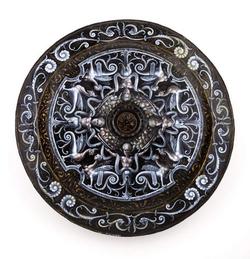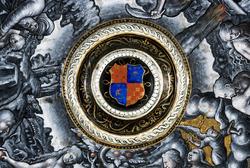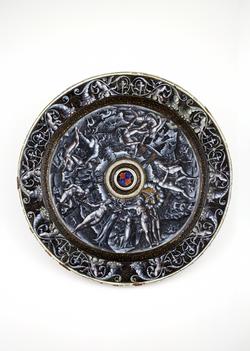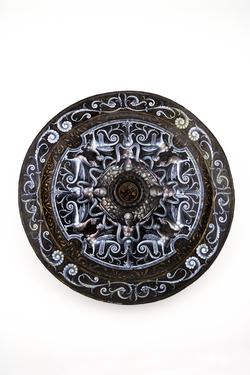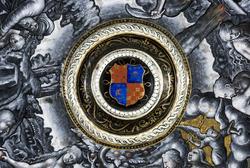Current Location: In storage
Titles
Basin for a ewer decorated with five scenes from Genesis
Maker(s)
Maker:
Reymond, Pierre
Printmaker:
Lucas van Leyden
(After)
Entities
Categories
Description
Copper enamelled in grisaille and pink flesh tones with five scenes from Genesis and gilded. Initialed PR. On the reverse, strapwork and grotesques.
Copper enamelled on both sides in grisaille with pale greyish-pink flesh tones over a black ground, and gilded. The front has also a little red and blue enamel. Circular with a sloping rim with raised outer edge, deep sides, gently curved well and central boss.
The boss has an almost flat medallion bearing a beribboned shield charged with the arms, quarterly 1 and 3 chequey gules and or, and 2 and 4, azure, a hound’s head, in chief, a label of three points and in base, a crescent or . This is surrounded by a raised white band decorated with black dots and continuous scalloping, a black cavetto with gold scrollwork, a band of black guilloche on a white ground, and tiny gold circles on a black band. Around this are five scenes from Genesis: the Creation of Eve, labelled ‘I’; the Fall of Man, labelled ‘II’; God admonishing Adam and Eve labelled ‘III’, initialled PR in black on the ground; the Expulsion from Paradise, labelled ‘GENESE III’; the Killing of Abel by Cain, labelled ‘IIII’. On the sides there is a repeating design of gold foliated scrolls on a black ground, and on the rim, pairs of foliated scrolls, each one terminating in a cornucopia, with a putto astride it, with sprays of gold foliage in the background.
On the reverse, the underside of the boss has a black ground, decorated with eight addorsed C- scrolls surrounded by scattered stars. On the back of the well there are four female terms linked by a continuous wavy drape, and holding up between them four dishes of fruit. Below each of which is a pair of affronted male and female monsters with wings and scrolling tails. Round the edge is a narrow and a broad band which rises into a small arch below the monsters. On the sides there are gold foliated scrolls on a black ground, and on the rim, foliated scrolls terminating in small monsters’ heads and shells.
Notes
History note: Baron Gustave de Rothschild (1829-1911); Sir Philip Sassoon, Bt., MP, CMG and the Countess of Rocksavage; Christie’s, 26-27 November, 1919, Catalogue of objets of art, porcelain & faience and fine French tapestry, the property of Sir Philip Sassoon, Bart, M.P., C.M.G., and of the Countess of Rocksavage, p. 10, lot 74; George Durlacher; Christie’s, 6-7 April 1938, Catalogue of Italian maiolica bronzes & objects of art, French and Italian furniture of the Renaissance, tapestry and textiles sold by order of George Durlacher Esq., p. 12, lot 32, illustrated opposite; the Fitzwilliam’s copy of the Catalogue is inscribed ‘‘Bt by Durlacher at his sale at Christie’s, by L.C.G. C.’; Louis Colville Gray Clarke, MA, LL D, Leckhampton, Cambridge.
Legal notes
Louis.C.G. Clarke Bequest, 1960
Measurements and weight
Diameter: 47.5 cm
Height: 5.3 cm
Acquisition and important dates
Method of acquisition: Bequeathed
(1961-04-27)
by
Clarke, Louis Colville Gray
Dating
16th Century, third quarter
Circa
1555
CE
-
1565
CE
Note
Circular basins were intended to accompany ewers, for hand washing at meals, but might also be displayed on a dressoir. Their decoration was designed to radiate inwards from the outer edge of the well towards the central boss, so that it would appear the right way up from all angles when the basin was lying flat with the ewer in situ. The biblical story of Adam and Eve and their sons, Cain and Able, told in the book of Genesis, 2-4, was well-suited for this purpose because it could be divided into a series of episodes.
The five scenes from Genesis which occupy the well of the basin were derived from a set of six engravings by Lucas van Leyden (1494-1533), dated 1529, but are not in the correct order:
The Creation of Eve
The Admonition not to eat the fruit of the Tree of Knowledge
The Fall of Man or Temptation
The Expulsion of Adam and Eve from Paradise
The murder of their son, Able by his older brother Cain
Here, the Admonition, God’s instruction to Adam and Eve not to eat the fruit from the Tree of Knowledge, appears to have been mistaken for God reprimanding them after they had done so. This, and the labelling of the scenes I, II, III, GENESE III and IIII, suggests that the painter was familiar with the woodcut illustrations by Bernard Salomon in Claude Paradin’s, 'Quadrins historique de la Bible', Lyon (Jean de Tournes), 1553, 1555 or 1558 editions which have the Admonition between the Fall and the Expulsion, and use Roman numerals to identify the scenes. This is also indicated by the presence of a pilaster at the end of a wall behind Adam and Eve in the Expulsion scene, which is not present on the van Leyden print, but is present in the woodcut by Salomon. The grotesque decoration on the reverse, may also be partly derived from an ornamental print of 1528 by Lucas van Leyden featuring pairs of long-necked sphinx-like creatures with curling tails. Incidentally this shows how illustrated books and prints circulated widely and were used by craftsmen as sources for their designs.
The story of Adam and Eve was extremely popular in the mid to late sixteenth century, and it was used on basins made in the Reymond workshop from at least 1557 until the mid 1560s. There are four initialled and dated examples by Pierre Reymond: at Waddesdon Manor Buckinghamshire, initialled ‘P.R’ twice, and dated 1557;) in the Hermitage, St Petersburg, initialled ‘P.R’ and dated 1558 twice, and having the arms of de Mesmes on the underside of the boss; dated 1558, in the Tucher-Schloss Museum, Nuremberg, initialled ‘PR’ and dated ‘1558’ separately twice on the back of the rim which belonged to Linhard I Tucher of Nuremberg (1487-1568); and in the Walters Art Gallery, Baltimore, initialled PR and dated 1563 on which the enameller used only four of the Lucas van Leyden prints and made up the figures for the Admonition. Philippe Verdier considered that the Fitzwilliam’s basin was probably earlier than the one at Baltimore. A further ewer basin, unseen, described as having ‘grisaille scenes symbolizing the Fall of Man with explanatory inscriptions’, and initialled and dated P.R. 1570, was exhibited by D.C. Marjoribanks, MP in the exhibition held in the South Kensington Museum in 1862. There are several undated circular basins, such as two in the Los Angeles County Museum, and one formerly in the collection of Gustaaf Hamburger, sold in 2008 (see Documentation). Several of these have either lost their central boss, or have had it replaced.
The unidentified coat of arms on the Fitzwilliam’s basin occurs on three small plates in the Louvre, decorated with scenes representing May, June, and September from a set of Labours of the Months (MR R 173 (formerly N 1370), MR 2436 (formerly N 1371) and MR 2435 (formerly N 1372), attributed by Baratte to Jean Court dit Vigier. However, when the Fitzwilliam's basin was illustrated by an engraving in the journal 'L’Art' in 1878, it was shown without a central boss, which seems to indicate that the arms were a later insertion (see Documentation).
School or Style
Renaissance
People, subjects and objects depicted
Components of the work
Decoration
composed of
enamel
gold
Materials used in production
Copper
Techniques used in production
Raising (metal forming process)
: Copper enamelled on both sides en grisaille with pale greyish-pink flesh tones on a black ground, and gilded. The front has also a little red and blue enamel.
Inscription or legends present
- Text: PR
- Location: On ground beside God admonishing Adam and Eve
- Method of creation: Painted in black
- Type: Initial
References and bibliographic entries
-
Exposition Historique de l'Art Ancien, Les Grandes Collections au Trocadero, Collections de MM les Barons de Rothschild (suite) Emaux
page(s): 24-33
-
Pierre Reymond, Emailleur à Limoges
page(s): 24-33
-
Catalogue of objects of art, porcelain and faience and fine French tapestry, the property of Sir Philip Sassoon Bart, MP, CMG and the Countess of Rocksavage of 25 Park Lane
page(s): 10
-
Catalogue of Italian maiolica bronzes and objects of art, French and Italian furniture of the Renaissance, tapestry and textiles sold by order of George Durlacher Esq.
page(s): 12
-
Feast & Fast. The Art of Food in Europe 1500-1800
page(s): 185, 252
-
Illustrated Bartsch, 12 Formerly Volume 7 (Part 3) Hans Baldung Grien, Hans Springklee, Lucas van Leyden
page(s): 131-5
-
The New Hollstein, Dutch and Flemish Etchings, Engravings and Woodcuts 1450-1700
page(s): 32-6
-
The Walters Art Gallery, Catalogue of the Painted Enamels of the Renaissance
page(s): 244-8
-
Painted Enamels of Limoges. XV & XVI Centuries, The State Ermitage Collection
page(s): 15
-
Émaux limousins du Musée national de l'Ermitage de Saint-Pétersbourg
-
Limozhskie raspisnye ėmali v sobranii Ėrmitazha/Émaux peints de Limoges de la collection de l'Ermitage
page(s): 144-7
-
The Painted Enamels of Limoges. A Catalogue of the Collection of the Los Angeles County Museum of Art
page(s): 99-107
-
Maleremails aus Limoges, Der Bestand des Berliner Kunstgewerbemuseums
page(s): 23. 25
-
Maleremails des 16. und 17. Jahrhunderts aus Limoges, Herzog Anton Ulrich-Museum Braunschweig, Kunstmuseum des Landes Niedersachsen
page(s): 25
-
Important European Furniture and Sculpture
-
Das Tucherservice
page(s): 63-92
-
The Wernher Collection, Luton Hoo. Catalogue, Part One General Guide. Part 2 Medieval and Renaissance Art in the Collection, Part Two
Related exhibitions
Identification numbers
Accession number: M.111-1961
Primary reference Number: 139821
Stable URI
Audit data
Created: Saturday 6 August 2011
Updated: Friday 1 August 2025
Last processed: Thursday 14 August 2025
Associated departments & institutions
Owner or interested party:
The Fitzwilliam Museum
Associated department:
Applied Arts
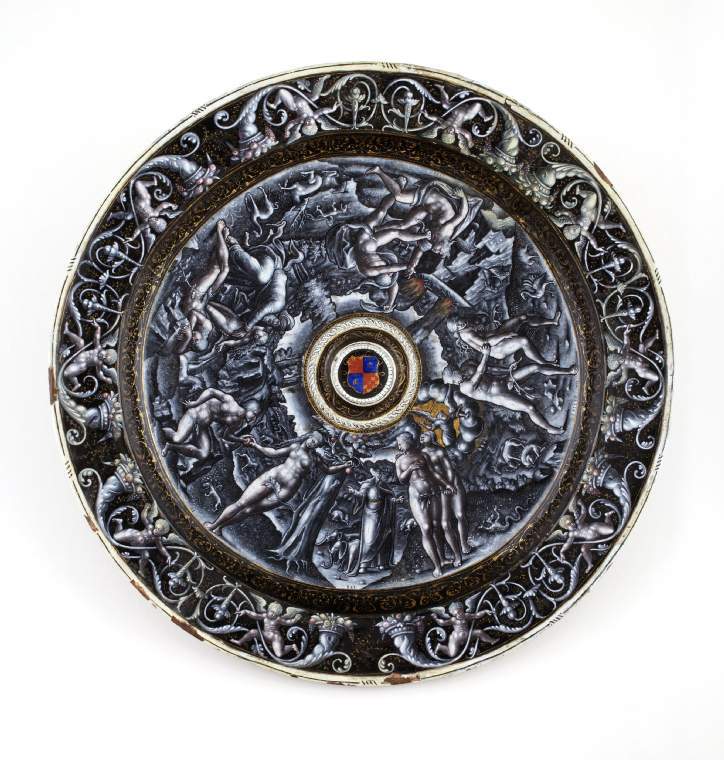
 IIIF Manifest
IIIF Manifest
